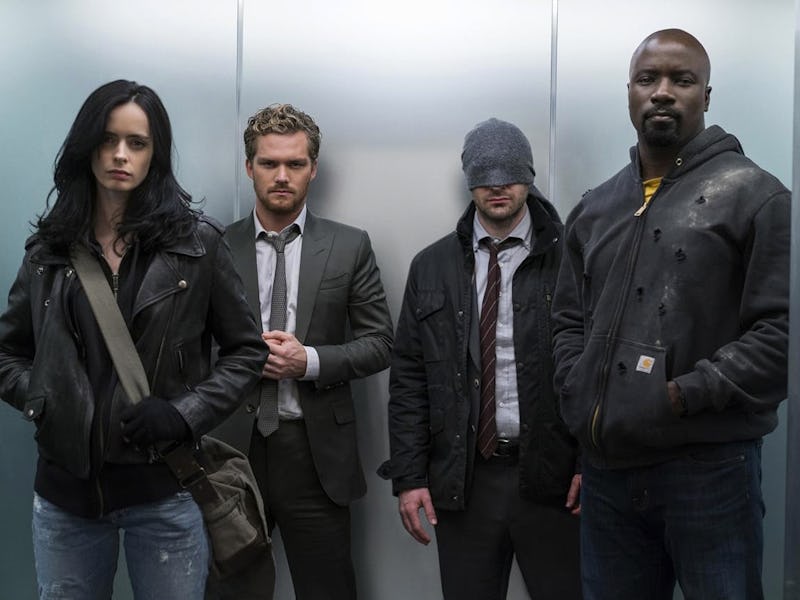Can The Defenders Save Marvel from Itself?
Netflix’s Defenders are officially MCU canon. What took Marvel so long?

For years, Marvel’s street-level collaboration with Netflix — which sired five mature, grungy shows and an Avengers-esque crossover — has been relegated to the far-flung corners of the franchise. The Defenders-verse, as it’s affectionately titled, walks a dubious line between canon and legend... even though it’s often regarded as one of the most successful products of the MCU.
The subfranchise thrived on Netflix for four years, offering a grungy, adult-focused alternative to Marvel’s frictionless efforts on the big screen. But when Disney and Marvel turned their gaze to streaming, the Defenders suddenly became defunct. Marvel launched a new crop of shows on Disney+, ending its partnership with Netflix by pulling their shows from the platform, and altogether ignoring the Defenders’ impact on the multiverse.
Though Charlie Cox reprised his role as Daredevil in Spider-Man: No Way Home, and is even attached to a new Daredevil show, Disney never took an official stance on the original Daredevil’s place in the canon. Ditto for Jessica Jones, Luke Cage, Iron Fist, and The Punisher. It seemed as though the studio was content to ignore the Netflix shows until they faded into obscurity — that is, until very recently.
The Defenders are finally getting pulled from the sidelines.
This month, Marvel exec Brad Winderbaum stated that Daredevil is MCU canon, at least from his point of view. Such a statement would have been promising enough on its own, but shortly after Winderbaum’s comments, the Netflix shows were each drafted into the official MCU timeline on Disney+. Now, Daredevil and Jessica Jones stand alongside films and shows like Captain America and Avengers: Endgame. Given the current state of the MCU, it certainly feels like a win... but why did it take Marvel so long to acknowledge its most underrated properties?
An easy answer lies in another statement from Winderbaum. Speaking to ScreenRant, the executive explained Marvel’s wariness with its less-official properties, chalking it up to the nature of their partnership with Netflix. “Up until this point, we've been a little bit cagey about what's Sacred Timeline, what's not Sacred Timeline,” Winderbaum said. “That was born of, frankly, a period at the studio where we were like, ‘We have to stick the landing with the vendors.’ It was another part of the company developing the Netflix stuff.”
Sharing the rights to one property will always pose complications to a franchise, but that’s not likely to be the only reason for Marvel’s cagey attitude. Until recently, the studio has felt way too big to fail. Marvel movies dominated the box office (and the cultural landscape) for nearly a decade. The Disney+ shows, meanwhile, launched at a time where everyone was stuck indoors, and so series like WandaVision and Loki became part of the new watercooler debrief.
There are still so many questions regarding the Defenders’ role in MCU canon — but why did it take so long to get to this point?
That streaming boom, however, was short-lived: the more content Marvel churned out, the less exciting it all seemed to be. Paired with trouble on the casting front, ordeals between visual effects teams, and a general dive in quality, Marvel is no longer the behemoth it once was. 2023 was especially rough for the franchise, and it’s now scrambling to recover some of that lost magic. Beggars can’t be choosers, as the saying goes — and with the new series Echo piggybacking off the Defenders’ success, it only makes sense to bring the Netflix series back into the fold. But as exciting and well-deserved as that confirmation is, is that enough to save Marvel Studios from its downward spiral?
Marvel and its parent company, Disney, have been hard at work righting a sinking ship. To some, the answer lies in a “quality over quantity” approach, which explains why so many Marvel projects have been pushed back to a near-future date. Reintegrating the Defenders seems to be another step in the right direction, but it’s going to take more than that to keep hope in the brand alive. There’s a sense that Marvel didn’t appreciate the Netflix series when the franchise was at its prime; it’s only now, in its efforts to return to a more successful era, that Marvel is willing to acknowledge its merits.
Even with a new canon established, though, Marvel still has a long way to go to reclaim its dominance. If the reception to new shows like Echo are any indication, Marvel can’t simply reintroduce old characters in the hopes of capturing audience interest anew. Nostalgia is certainly appealing, and it’s saved Disney’s other franchises (cough, Lucasfilm) more often than it should have. But the studio’s goodwill is running out fast, and the Defenders can only do so much in the grand scheme.
This article was originally published on